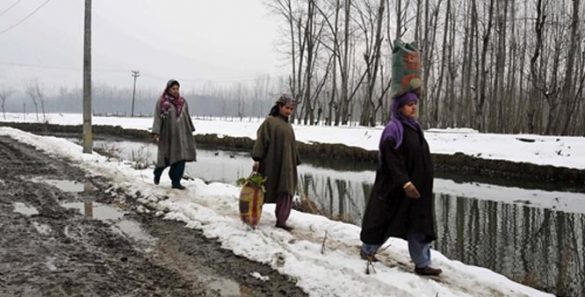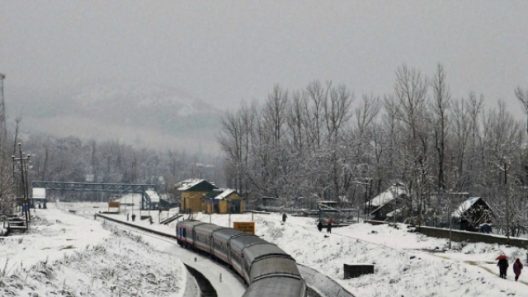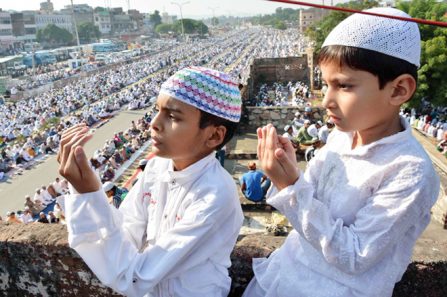Every year, all over the world, Muslims find the best escape in auspicious religious holidays, a time when families get together and celebrate the joy that has been blessed upon them by Allah Almighty. We bring gifts for each other, we salvage and eat together, however, not everyone is lucky enough. This Eid-Al-Adha tale from the valley of Kashmir will tell you why.
This is the story of a young Kashmiri boy Mahdi, his father and some strangers. This is a story of what sacrifice really means. The beauty of Kashmir.

Source: jknewspoint.com
“Pa never had much compassion for the lazy or those who squandered their means and then never had enough for the necessities. But for those who were genuinely in need, his heart was as big as all outdoors. It was from him that I (Mahdi) learned the greatest joy in life comes from giving, not from receiving.
It was a cold winter day before Eid al-Adha 1425 A.H. in a village near Srinagar in Kashmir. I was fifteen years old and feeling like the world had caved in on me because there just had not been enough money to buy me the bicycle that I had wanted for Eid al-Adha. We did the chores early that night for some reason. I just figured Pa wanted a little extra time so we could read in the stories from Noble Quran.
After supper was over I took my boots off and stretched out in front of the fireplace and waited for Pa to get down the old book of stories from the Noble Quran. I was still feeling sorry for myself and, to be honest, I was not in much of a mood to read stories from the Noble Quran. But Pa did not get the book; instead he bundled up again and went outside. I could not figure it out because we had already done all the chores. I did not worry about it long though; I was too busy wallowing in self-pity.
Soon Pa came back in. It was a cold clear night out and there was ice in his beard. “Come on, Mahdi,” he said. “Bundle up good, it’s cold out tonight.” I was really upset then. Not only was not I am getting the bicycle for Eid al-Adha (Feast of Sacrifice in Islam), now Pa was dragging me out in the cold, and for no earthly reason that I could see. We had already done all the chores, and I could not think of anything else that needed doing, especially not on a night like this.
But I knew Pa was not very patient at one dragging one’s feet when he had told them to do something, so I got up and put my boots back on and got my cap and coat. Ma gave me a mysterious smile as I opened the door to leave the house. Something was up, but I did not know what.
Outside, I became even more dismayed. There in front of the house was the work team, already hitched to the big sled. Whatever it was we were going to do was not going to be a short, quick, little job. I could tell. We never hitched up this sled unless we were going to haul a big load.
[adinserter block=”3″]
Pa was already up on the seat, reins in hand. I reluctantly climbed up beside him. The cold was already biting at me. I was not happy. When I was on, Pa pulled the sled around the house and stopped in front of the woodshed. He got off and I followed. “I think we will put on the high sideboards,” he said. “Here, help me.” The high sideboards! It had been a bigger job than I wanted to do with just the low sideboards on, but whatever it was we were going to do would be a lot bigger with the high sideboards on.
After we had exchanged the sideboards, Pa went into the woodshed and came out with an armload of wood – the wood I did spent all summer hauling down from the mountain, and then all Fall sawing into blocks and splitting. What was he doing? Finally I said something. “Pa,” I asked, “what are you doing?”
“You been by the Widow Mrs. Mukhtar’s house lately?” he asked. The Widow Mrs. Mukhtar lived about two miles down the road. Her husband had died a year or so before and left her with three children, the oldest being eight. Sure, I had been by, but so what?
“Yeah,” I said, “Why?” “I rode by just today,” Pa said. “Little Jaffer was out digging around in the woodpile trying to find a few chips. They are out of wood, Mahdi.”
That was all he said and then he turned and went back into the woodshed for another armload of wood. I followed him. We loaded the sled so high that I began to wonder if the horses would be able to pull it. Finally, Pa called a halt to our loading, and then he went to the house.

Source: staticindia.com
When he returned he was carrying a sack of flour over his right shoulder and a smaller sack of something in his left hand. “What’s in the little sack?” I asked. “Shoes. They’re out of shoes. Little Jaffer just had gunny sacks wrapped around his feet when he was out in the woodpile this morning. I got the children some Mithai (sweets) too. It just would not be Eid al-Adha without Mithai.”
We rode the two miles to Widow Mukhtar’s pretty much in silence. I tried to think through what Pa was doing. We did not have much by worldly standards. Of course, we did have a big woodpile, though most of what was left now was still in the form of logs that I would have to saw into blocks and split before we could use it. We also had meat and flour, so we could spare that, but I knew we did not have any money, so why was Pa buying them shoes and sweets?
Really, why was he doing any of this? Mrs. Mukhtar had closer neighbors than us; it should not have been our concern. We came in from the blind side of the Mukhtar’s house and unloaded the wood as quietly as possible, and then we took the sweets, flour and shoes to the door. We knocked. The door opened a crack and a timid voice said, “Who is it?”
“It is me Karim Khan, Ma’am, and my son, Mahdi. Could we come in for a bit?”
Mrs. Mukhtar opened the door and let us in. She had a blanket wrapped around her shoulders. The children were wrapped in another and were sitting in front of the fireplace by a very small fire that hardly gave off any heat at all. Mrs. Mukhtar fumbled with a match and finally lit the lamp.
“We brought you a few things, Ma’am,” Pa said and set down the sack of flour. I put the sweet on the table. Then Pa handed her the sack that had the shoes in it.
She opened it hesitantly and took the shoes out one pair at a time. There was a pair for her and one for each of the children – sturdy shoes, the best, shoes that would last. I watched her carefully. She bit her lower lip to keep it from trembling and then tears filled her eyes and started running down her cheeks. She looked up at Pa like she wanted to say something, but it would not come out.
“We brought a load of wood too, Ma’am,” Pa said. He turned to me and said, “Mahdi, go bring in enough to last a while. Let’s get that fire up to size and heat this place up.” I wasn’t the same person when I went back out to bring in the wood. I had a big lump in my throat and as much as I hate to admit it, there were tears in my eyes too.
In my mind I kept seeing those three kids huddled around the fireplace and their mother standing there with tears running down her cheeks with so much gratitude in her heart that she could not speak. My heart swelled within me and a joy that I had never known before, filled my soul. I had given at Eid al-Adha many times before, but never when it had made so much difference. I could see we were literally saving the lives of these people.
[adinserter block=”3″]
I soon had the fire blazing and everyone’s spirits soared. The kids started giggling when Pa handed them each a piece of sweet and Mrs. Mukhtar looked on with a smile that probably had not crossed her face for a long time. She finally turned to us. “May Allah bless you,” she said. “I know Allah has sent you. The children and I have been praying that He would send some help to spare us.”
In spite of myself, the lump returned to my throat and the tears welled up in my eyes again. I had never thought of Pa in those exact terms before, but after Mrs. Mukhtar mentioned it I could see that it was probably true. I was sure that a better man than Pa had never walked the earth. I started remembering all the times he had gone out of his way for Ma and me, and many others. The list seemed endless as I thought on it.
Pa insisted that everyone try on the shoes before we left. I was amazed when they all fit and I wondered how he had known what sizes to get. Tears were running down Widow Mrs. Mukhtar’s face again when we stood up to leave. Pa took each of the kids in his big arms and gave them a hug. They clung to him and did not want us to go. I could see that they missed their Pa, and I was glad that I still had mine.
At the door Pa turned to Mrs. Mukhtar and said, “My wife wanted me to invite you and the children over for Eid al-Adha (Feast of Sacrifice in Islam) dinner tomorrow. The chicken will be more than the three of us can eat, and a man can get cantankerous if he has to eat chicken for too many meals. We will be by to get you about five. It will be nice to have some little ones around again. Mahdi, here, has not been little for quite a spell.”
I was the youngest. My two brothers and two sisters had all married and had moved away. Mrs. Mukhtar nodded and said, “Thank you, Brother Karim Khan. I do not have to say, “‘May Allah bless you,’ I know for certain that He will. And may he bless Kashmir!”

Source: staticindia.com
Out on the sled I felt warmth that came from deep within and I did not even notice the cold. When we had gone a ways, Pa turned to me and said, “Mahdi, I want you to know something. Your Ma and I have been tucking a little money away here and there all year so we could buy that bicycle for you, but we did not have quite enough. Then yesterday a man who owed me a little money from years back came by to make things square. Your Ma and I were real excited, thinking that now we could get you that bicycle, and I started into town this morning to do just that. But on the way I saw little Jaffer out scratching in the woodpile with his feet wrapped in those gunny sacks and I knew what I had to do. Son, I spent the money for shoes and a little sweet for those children. I hope you understand.”
I understood, and my eyes became wet with tears again. I understood very well, and I was so glad Pa had done it. Now the bicycle seemed very low on my list of priorities. Pa had given me a lot more. He had given me the look on Widow Mrs. Mukhtar’s face and the radiant smiles of her three children.
For the rest of my life, Whenever I saw any of the Mukhtar’s, or split a block of wood, I remembered, and remembering brought back that same joy I felt riding home beside Pa that night. Pa had given me much more than a bicycle that night; he had given me the best Eid al-Adha of my life.”
Sacrifice doesn’t just mean running a knife on an animal’s throat, the term sacrifice can be dubbed in a lot of manners. This story from Kashmir proves that the control on ‘nafs’ and ‘wants’ in order to provide for someone else’s needs is a sacrifice in itself.
Source: ezsoftech – Kashmir eid











